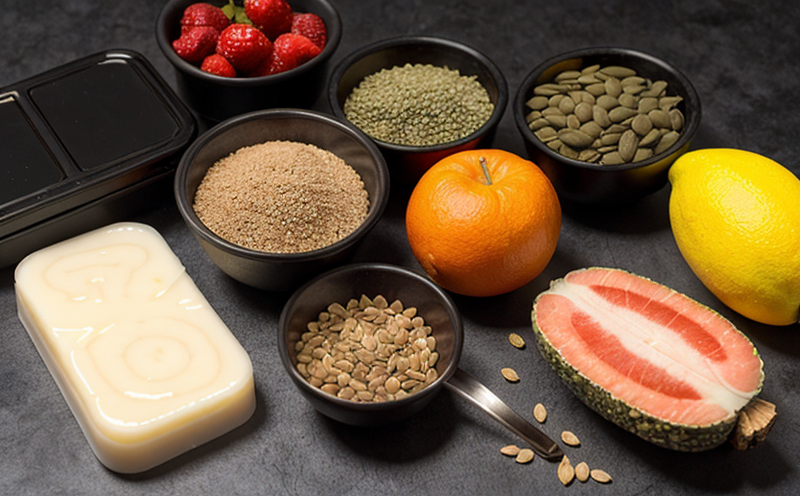EN 12127 Determination of Moisture Content in Dehydrated Foods
The determination of moisture content is a critical parameter in ensuring product quality and safety across various sectors, including food, feed, pharmaceuticals, and cosmetics. In dehydrated foods, accurate measurement of moisture content is essential for maintaining the product's shelf life, safety standards, and overall quality. This section focuses on EN 12127, a European standard that provides comprehensive guidelines for determining the moisture content in dehydrated foods.
The method described in EN 12127 is based on gravimetric analysis using a drying oven, which involves heating the sample to drive off moisture and then measuring the weight loss. This approach ensures precision and reliability, making it suitable for laboratories that need consistent results. The standard specifies detailed procedures, including specimen preparation, equipment requirements, and calculation of moisture content.
The importance of accurate moisture content determination in dehydrated foods cannot be overstated. Moisture content directly affects the product's stability, microbial growth potential, and overall safety. Excess moisture can lead to mold growth, spoilage, and increased risk of foodborne illnesses. Conversely, insufficient moisture can result in poor texture and reduced shelf life.
EN 12127 is widely used by quality managers, compliance officers, R&D engineers, and procurement professionals who require precise measurements for regulatory compliance and product development. By adhering to this standard, laboratories ensure that their testing methods are consistent with international best practices.
The test procedure outlined in EN 12127 involves several key steps:
- Specimen Preparation: Samples must be representative of the batch or lot being tested. This may involve grinding or cutting to achieve a uniform particle size.
- Drying Oven Setup: The oven is preheated and maintained at 103°C ± 2°C until a constant weight is achieved, indicating that all volatile components have been removed.
- Weighing: The sample is weighed before and after drying to calculate the percentage of moisture content using the formula: (W1 - W2) / W1 * 100, where W1 is the initial weight and W2 is the final weight.
- Data Interpretation: The results are reported according to ISO standards, providing a standardized format for comparison across laboratories.
This method ensures that moisture content measurements are accurate and reliable, which is crucial for maintaining product quality and compliance with regulatory requirements. Laboratories that adopt EN 12127 can expect consistent, repeatable results, enhancing their reputation in the industry.
Understanding the significance of this test helps stakeholders appreciate its role in ensuring food safety and quality. Compliance with international standards like EN 12127 is essential for maintaining consumer trust and regulatory compliance.
Why It Matters
The accurate determination of moisture content using EN 12127 is crucial for several reasons:
- Product Safety: Excess moisture can lead to the growth of harmful microorganisms, posing a significant risk to consumers. Ensuring that products meet specific moisture content levels helps prevent such hazards.
- Quality Assurance: Moisture content is one of several parameters that influence product quality. Consistent and accurate measurements help maintain consistent product characteristics across batches.
- Regulatory Compliance: Many countries have strict regulations regarding the moisture content in dehydrated foods. Adhering to standards like EN 12127 ensures compliance with these regulations, avoiding potential legal issues.
- Consumer Trust: Reliable testing methods build trust among consumers who value high-quality and safe products. Consistent results from laboratories that follow international standards contribute to this trust.
The importance of moisture content in dehydrated foods cannot be overstated, as it directly impacts the product's shelf life, safety, and overall quality. By ensuring accurate measurements through EN 12127, laboratories play a critical role in maintaining these essential aspects.
Why Choose This Test
Selecting an appropriate moisture content test is vital for achieving reliable results that meet both internal and external requirements. Here’s why EN 12127 Determination of Moisture Content in Dehydrated Foods stands out:
- International Recognition: This method is widely recognized and used across Europe, ensuring consistency and comparability with other laboratories.
- Precision: The gravimetric approach provides highly precise results, which are crucial for meeting stringent quality control standards.
- Regulatory Compliance: Adherence to EN 12127 ensures that your laboratory meets regulatory requirements and industry standards.
- Data Reliability: Consistent results across multiple batches or samples enhance the reliability of your data, which is essential for research and development activities.
- Expertise: Our team of experts has extensive experience in performing moisture content tests using EN 12127, ensuring accurate and reliable outcomes.
By choosing this test, you ensure that your laboratory maintains a high level of accuracy and reliability, which is essential for maintaining product quality and regulatory compliance. This method also supports continuous improvement initiatives within your organization by providing consistent and precise data.





